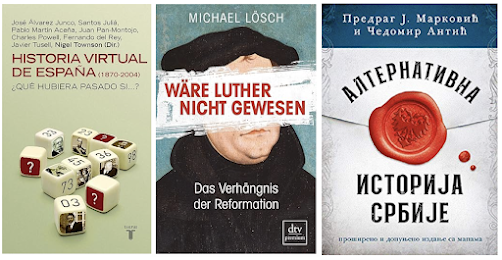The Globalization of Counterfactual History: A Short Bibliography of Recent Anthologies
In working on my current book, I have been struck by the global appeal of wondering “what if?” As I write my concluding chapter, which deals with trends from the past generation, I have been amazed to see that edited collections of counterfactual and alternate history have appeared in an extremely wide range of countries.
The list thus far includes – in addition to the U. S. and U. K. -- Australia, New Zealand, Ireland, Germany, France, Spain, Poland, Hungary, Finland, Serbia, Mexico, and Argentina.
The volumes that have appeared in these countries include the following anthologies:
U. S./U.K.
Andrew Roberts, ed., What Might Have Been: Leading Historians on Twelve ‘What Ifs’ of History (2004): Duncan Brack’s three anthologies, Prime Minister Portillo…and Other Things That Never Happened (2003), President Gore…and Other Things That Never Happened (2006), and Prime Minister Boris...and Other Things That Never Happened (2012); Steve Tally’s, Almost America: From the Colonists to Clinton: A ‘What If’ History of the U. S. (2000); Roger Bruns’s anthology and document collection, Almost History: Close Calls, Plan B's, and Twists of Fate in America's Past (2001); Philip Tetlock, Richard Ned Lebow, and Geoffrey Parker’s essay collection, Unmaking the West (2006); Francis Beckett’s volume, The Prime Ministers Who Never Were: A Collection of Political Counterfactuals (2011), and Gavriel Rosenfeld, ed., What Ifs of Jewish History: From Abraham to Zionism (2015); Eugene Byrne’s and Kim Newman, Back in the USSA (Shingletown, CA, 1997); Adam Chamberlain and Brian A. Dixon, Columbia & Britannia (Fourth Horseman Press, 2009).
AUSTRALIA/NEW ZEALAND
Stuart Macintyre and Sean Scalmer, eds., What If? Australian History as it Might Have Been (Melbourne, 2006; Stephen Levine, ed., New Zealand as it Might Have Been, Volume I (Wellington, 2006); Stephen Levine, ed., New Zealand as it Might Have Been, Volume II (Wellington, 2011);
IRELAND
Diarmaid Ferriter, ed., What If: Alternative Views of 20th century Ireland (Dublin, 2006);
GERMANY
Tobias Winnerling and Christoph Nonn, eds., Eine andere Deutsche Geschichte 1517-2017: Was Wäre Wenn... (Paderborn, 2017); Michael Lösch, ed., Wäre Luther nicht gewesen: Das Verhängnis der Reformation, Ein Thesenbuch (Munich, 2017); Hans-Peter von Peschke, ed., Was wäre wenn: Alternative Geschichte (Darmstadt 2014); Georg Ruppelt: Nachdem Martin Luther Papst geworden war und die Alliierten den Zweiten Weltkrieg verloren hatten. Literarische Alternativen zur besten der Welten (Hannover, 2007).
SPAIN
Nigel Townson, ed., Historia virtual de España (1870-2004): ¿Qué hubiera pasado si...? (Madrid, 2004).
FRANCE
Anthony Rowley and Fabrice D'Almeida eds, Et si on refaisait l'histoire? (Paris, 2009); Xavier Delacroix, ed., L'autre siècle: Et si les Allemands avaient gagné la bataille de la Marne? (Paris, 2018); André-Francois, Ruaud, ed., Passés recomposes: Anthologie uchronique (Aix-en-Provence, 2003).
POLAND
Andrzej Chwalba and Wojciech Harpula, eds., Zwrotnice dziejów: Alternatywne historie Polski (Krakow, 2019).
HUNGARY
Balasz Ablonczy, et al., eds., Nézzünk Bizakodva A Múltba! - Alternatív Trianon (Budapest, 2020).
FINLAND
M. K. Niemi ja Ville Pernaa, ed., Entäs os…Vaihtoehtoinen Suomen historia (2005);
SERBIA
Čedomir Antić, Predrag J. Marković, eds., Alternativna istorija Srbije (Belgrade, 2016).
MEXICO
Special issue of Letras Libres, entitled “Pasados Imaginarios” (Imaginary Pasts) (2008).
ARGENTINA
Rosendo Fraga, ¿Qué hubiera pasado si...? historia argentina contrafáctica (Buenos Aires, 2008).



Comments
Best,
Gavriel
"Es hätte auch anders kommen können. Wendepunkte deutscher Geschichte" (Alexander Demandt):
https://books.google.de/books/about/Es_h%C3%A4tte_auch_anders_kommen_k%C3%B6nnen.html?id=fhlGAQAAIAAJ&redir_esc=y